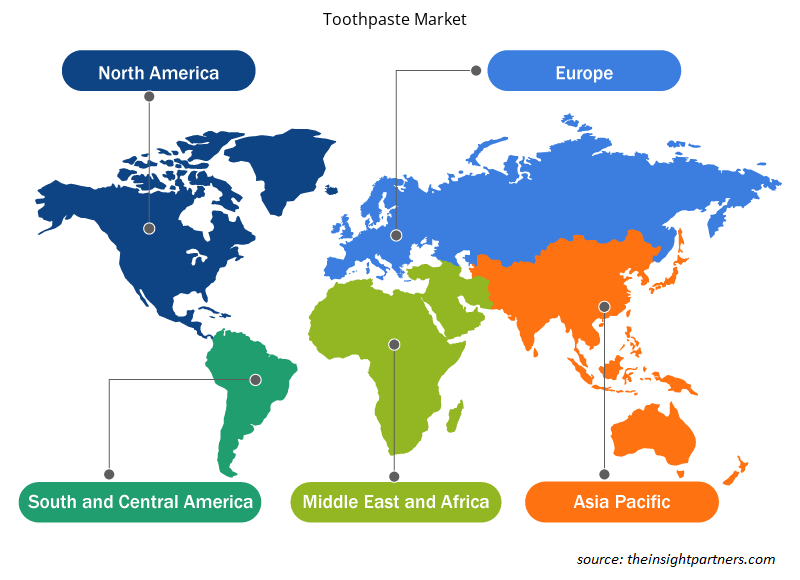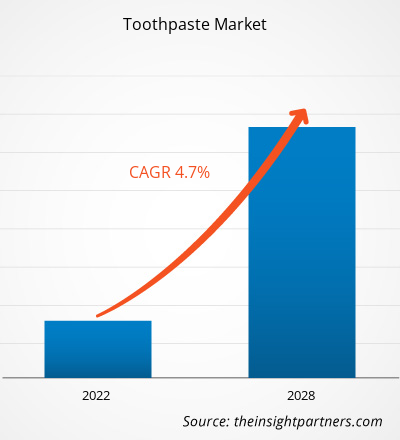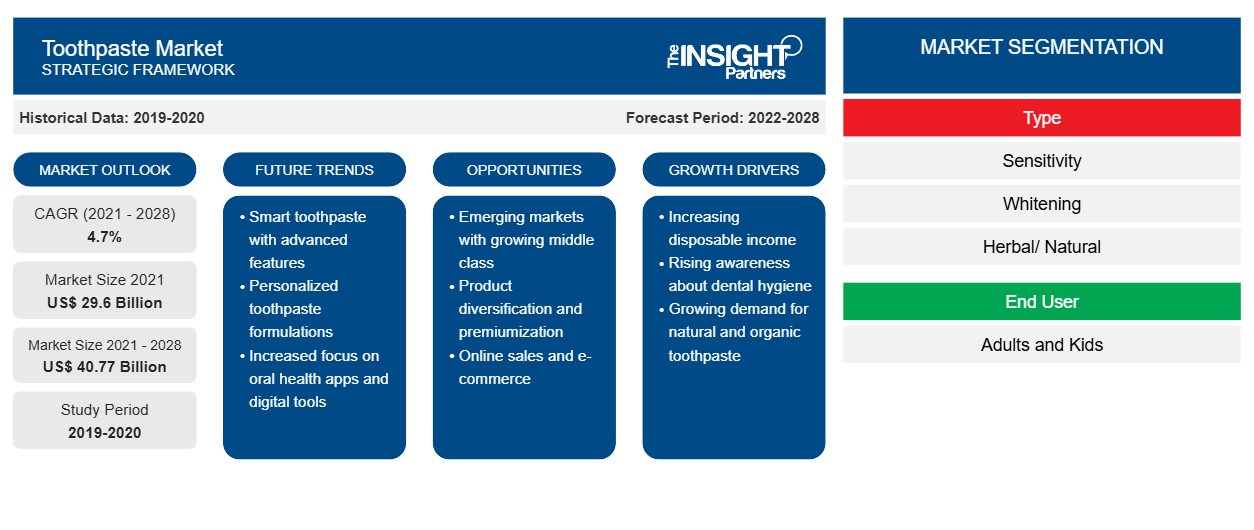[Rapporto di ricerca] Il mercato del dentifricio è stato valutato a 29.598,97 milioni di dollari nel 2021 e si prevede che raggiungerà i 40.766,21 milioni di dollari entro il 2028; si prevede che crescerà a un CAGR del 4,7% dal 2021 al 2028.
In termini di volume, si prevede che la domanda globale di dentifricio raggiungerà oltre 19 miliardi di unità entro il 2028.
Un dentifricio è derivato da vari componenti, i tre principali dei quali sono abrasivi, fluoro e detergenti. Il dentifricio è usato per promuovere l'igiene orale: è un abrasivo che aiuta a rimuovere la placca e il cibo dai denti, aiuta a sopprimere l'alito cattivo e fornisce ingredienti attivi (più comunemente fluoro) per curare la carie e prevenire le malattie gengivali.
Nel 2020, l'Asia Pacifica ha rappresentato la quota maggiore del mercato globale dei dentifrici . È probabile che l'America meridionale e centrale registri il CAGR più elevato durante il periodo di previsione. Il mercato dei dentifrici nella regione comprende diverse economie come Australia, India, Cina, Giappone, Corea del Sud e il resto dell'APAC. I principali fattori che guidano il mercato dei dentifrici sono una solida base di clienti, una maggiore consapevolezza della salute e dell'igiene orale e cambiamenti negli stili di vita. In India, la sensibilità dei denti è molto diffusa. Nella regione c'è un'elevata domanda di offerte basate sulle necessità, come dentifrici per la sensibilità dei denti, dentifrici sbiancanti, dentifrici in gel o dentifrici con ingredienti naturali ed erboristici. Queste categorie di dentifrici otterranno una quota più significativa nei prossimi anni. C'è un'elevata domanda di dentifrici con gusti diversi. Con un netto cambiamento nella domanda dei consumatori di dentifrici naturali, il sottosegmento naturale ed erboristico del mercato dei dentifrici sta crescendo più rapidamente.
Personalizza questo report in base alle tue esigenze
Riceverai la personalizzazione gratuita di qualsiasi report, comprese parti di questo report, o analisi a livello nazionale, pacchetto dati Excel, oltre a usufruire di grandi offerte e sconti per start-up e università
-
Scopri le principali tendenze di mercato in questo rapporto.Questo campione GRATUITO includerà analisi di dati che spaziano dalle tendenze di mercato alle stime e alle previsioni.
La pandemia di COVID-19 ha fortemente influenzato l'intero settore della cura della persona. I rivenditori di prodotti per la cura della persona sono costretti a dare priorità solo a prodotti essenziali come cibo, bevande e prodotti per l'igiene personale come dentifricio, disinfettanti e saponi, insieme a dimensioni di assortimento ridotte e unità di stoccaggio (SKU) di altre categorie di prodotti come il dentifricio alle erbe. Il blocco mondiale, dovuto alla pandemia di COVID-19, ha particolarmente influenzato il comportamento di acquisto dei consumatori, modellando le abitudini di acquisto dei consumatori. Come risultato dell'epidemia, si è verificato un cambiamento nell'inclinazione dei consumatori verso i prodotti per l'igiene. Inoltre, la tendenza dei consumatori verso prodotti privi di additivi e sostanze chimiche tossiche è stata un fattore critico che ha spinto la domanda di prodotti di dentifricio alle erbe durante questo blocco. A causa della mancanza di accessibilità ai prodotti di dentifricio alle erbe nei negozi al dettaglio, i consumatori si stanno orientando verso i canali di e-commerce per ottenere questi prodotti. Tuttavia, si prevede che la mancanza di prodotti e i problemi logistici produrranno un divario tra domanda e offerta nelle piattaforme online.SKUs) of other product categories such as herbal toothpaste. The worldwide lockdown, owing to the COVID-19 pandemic, has especially inclined consumer buying behavior by shaping consumer purchasing habits. As a result of the outbreak, there is a shift in consumer inclination toward hygiene products. Moreover, the tendency of consumers toward products free from additives and toxic chemicals has been a critical factor propelling the demand for herbal toothpaste products during this lockdown. Due to the lack of accessibility of herbal toothpaste products in retail stores, consumers are inclining toward e-commerce channels to obtain these products. However, the lack of products and logistics issues are projected to produce a supply-demand gap in online platforms.
Approfondimenti di mercato
Problemi dentali nella popolazione geriatrica e pediatrica
Il crescente numero di bambini sta riscontrando problemi dentali, il che dovrebbe alimentare significativamente la crescita del mercato. Secondo l'Organizzazione Mondiale della Sanità, a marzo 2020, quasi 530 milioni di bambini in tutto il mondo avevano carie sui denti primari. Inoltre, la crescita della popolazione geriatrica sta aumentando la domanda di dentifricio poiché questa fascia d'età è altamente vulnerabile a diversi problemi dentali come carie, malattie gengivali e cavità dentali. Secondo il Dipartimento della Salute e dei Servizi Umani degli Stati Uniti, circa 1 bambino su 5 (20%) di età compresa tra 5 e 11 anni ha almeno un dente cariato non trattato. Inoltre, 1 adolescente su 7 (13%) di età compresa tra 13 e 19 anni ha almeno un dente cariato non trattato. Oltre a questo, quasi tutti gli adulti (96%) di età pari o superiore a 65 anni hanno avuto una carie; 1 su 5 ha una carie non trattata.
Tipo Informazioni
In base al tipo, il mercato globale dei dentifrici è segmentato in sensibili, sbiancanti, erboristici/naturali, per fumatori e medicinali. Il segmento sbiancante ha guidato il mercato globale dei dentifrici nel 2020. Il dentifricio sbiancante è realizzato per promuovere lo sbiancamento dei denti. Questi dentifrici sbiancanti possono sbiancare leggermente i denti rimuovendo le macchie superficiali dai denti. Per rimuovere le macchie superficiali, il dentifricio sbiancante include principalmente particelle abrasive speciali o sostanze chimiche che lucidano delicatamente i denti. La domanda sempre crescente di denti più bianchi ha portato a un aumento del mercato dei dentifrici sbiancanti. I marchi che forniscono dentifrici sbiancanti includono Crest, Colgate, Toms of Maine e Arm & Hammer.
Tra i principali attori del mercato dei dentifrici figurano Procter & Gamble; Unilever; GlaxoSmithKline Plc.; Colgate-Palmolive Company; Henkel Ag & Company, KGAA; 3M; Sunstar Suisse SA; Lion Corporation; Beverly Glen Laboratories, Inc.; e The Himalaya Drug Company.
Approfondimenti regionali sul mercato dei dentifrici
Le tendenze regionali e i fattori che influenzano il mercato dei dentifrici durante il periodo di previsione sono stati ampiamente spiegati dagli analisti di Insight Partners. Questa sezione discute anche i segmenti e la geografia del mercato dei dentifrici in Nord America, Europa, Asia Pacifico, Medio Oriente e Africa e Sud e Centro America.

- Ottieni i dati specifici regionali per il mercato dei dentifrici
Ambito del rapporto sul mercato dei dentifrici
| Attributo del report | Dettagli |
|---|---|
| Dimensioni del mercato nel 2021 | 29,6 miliardi di dollari USA |
| Dimensioni del mercato entro il 2028 | 40,77 miliardi di dollari USA |
| CAGR globale (2021 - 2028) | 4,7% |
| Dati storici | 2019-2020 |
| Periodo di previsione | 2022-2028 |
| Segmenti coperti |
Per tipo
|
| Regioni e Paesi coperti |
America del Nord
|
| Leader di mercato e profili aziendali chiave |
|
Densità dei player del mercato del dentifricio: comprendere il suo impatto sulle dinamiche aziendali
Il mercato del dentifricio sta crescendo rapidamente, spinto dalla crescente domanda degli utenti finali dovuta a fattori quali l'evoluzione delle preferenze dei consumatori, i progressi tecnologici e una maggiore consapevolezza dei benefici del prodotto. Con l'aumento della domanda, le aziende stanno ampliando le loro offerte, innovando per soddisfare le esigenze dei consumatori e capitalizzando sulle tendenze emergenti, il che alimenta ulteriormente la crescita del mercato.
La densità degli operatori di mercato si riferisce alla distribuzione di aziende o società che operano in un particolare mercato o settore. Indica quanti concorrenti (operatori di mercato) sono presenti in un dato spazio di mercato in relazione alle sue dimensioni o al valore di mercato totale.
Le principali aziende che operano nel mercato dei dentifrici sono:
- Procter & Gamble
- Unilever
- Società anonima GlaxoSmithKline Plc.
- Azienda Colgate-Palmolive
- Henkel AG & Company, KGAA
Disclaimer : le aziende elencate sopra non sono classificate secondo un ordine particolare.

- Ottieni una panoramica dei principali attori del mercato dei dentifrici
Segnala i riflettori
- Tendenze industriali progressive nel mercato globale dei dentifrici per aiutare gli operatori a sviluppare strategie efficaci a lungo termine
- Strategie di crescita aziendale adottate dai mercati sviluppati e in via di sviluppo
- Analisi quantitativa del mercato globale dei dentifrici dal 2019 al 2028
- Stima della domanda di dentifricio nei vari settori industriali
- Analisi PEST per illustrare l'efficacia degli acquirenti e dei fornitori che operano nel settore per prevedere la crescita del mercato
- Sviluppi recenti per comprendere lo scenario competitivo del mercato e la domanda di dentifricio.
- Tendenze e prospettive del mercato, insieme ai fattori che guidano e frenano la crescita del mercato del dentifricio
- Processo decisionale attraverso la comprensione delle strategie che sostengono l'interesse commerciale in relazione alla crescita del mercato globale dei dentifrici
- La dimensione del mercato del dentifricio nei vari nodi del mercato
- Panoramica dettagliata e segmentazione del mercato globale dei dentifrici, nonché delle sue dinamiche nel settore
- Le dimensioni del mercato del dentifricio in varie regioni con promettenti opportunità di crescita
Il rapporto include la segmentazione del mercato globale dei dentifrici come segue:
In base al tipo, il mercato globale dei dentifrici è segmentato in sensibili, sbiancanti (anti-carie e altri), erboristici/naturali, fumatori e medicinali. In termini di utente finale, il mercato è segmentato in adulti e bambini. In base al tipo di base, il mercato è segmentato in gel e non gel. In base al canale di distribuzione, il mercato è segmentato in supermercati e ipermercati, minimarket, vendita al dettaglio online e farmacie/farmacie. In base alla geografia, il mercato dei dentifrici è ampiamente segmentato in Nord America, Europa, Asia Pacifico (APAC), Medio Oriente e Africa (MEA) e Sud e Centro America. Il mercato in Nord America è ulteriormente segmentato in Stati Uniti, Canada e Messico. Il mercato dei dentifrici in Europa è ulteriormente segmentato in Germania, Francia, Regno Unito, Italia, Russia e resto d'Europa. Il mercato in Asia Pacifico è ulteriormente segmentato in Cina, India, Giappone, Australia, Corea del Sud e resto dell'Asia Pacifico. Il mercato dei dentifrici in Medio Oriente e Africa (MEA) è ulteriormente segmentato in Sud Africa, Arabia Saudita, Emirati Arabi Uniti e resto del MEA. Il mercato in America meridionale e centrale è ulteriormente segmentato in Brasile, Argentina, Cile, Colombia e resto dell'America meridionale e centrale.
Profili aziendali
- 3 milioni
- Procter & Gamble
- Unilever
- Società anonima GlaxoSmithKline Plc.
- Azienda Colgate-Palmolive
- Henkel AG & Company KGAA
- Sunstar Svizzera SA
- Società del leone
- Laboratori Beverly Glen, Inc.
- La compagnia farmaceutica Himalaya
- Analisi storica (2 anni), anno base, previsione (7 anni) con CAGR
- Analisi PEST e SWOT
- Valore/volume delle dimensioni del mercato - Globale, Regionale, Nazionale
- Industria e panorama competitivo
- Set di dati Excel
Report recenti
Testimonianze
Motivo dell'acquisto
- Processo decisionale informato
- Comprensione delle dinamiche di mercato
- Analisi competitiva
- Analisi dei clienti
- Previsioni di mercato
- Mitigazione del rischio
- Pianificazione strategica
- Giustificazione degli investimenti
- Identificazione dei mercati emergenti
- Miglioramento delle strategie di marketing
- Aumento dell'efficienza operativa
- Allineamento alle tendenze normative























 Ottieni un campione gratuito per - Mercato del dentifricio
Ottieni un campione gratuito per - Mercato del dentifricio